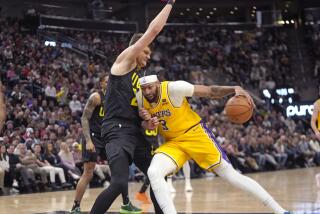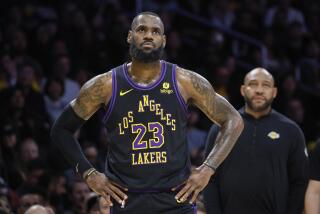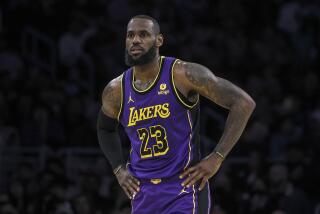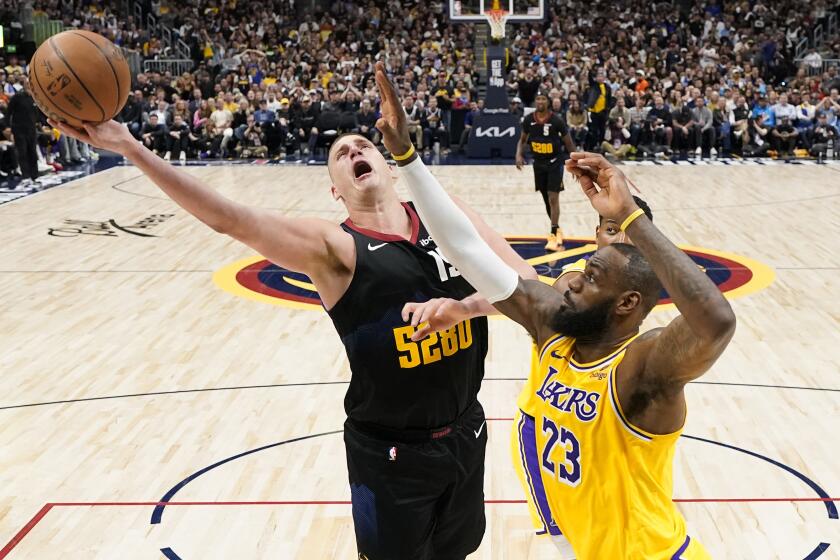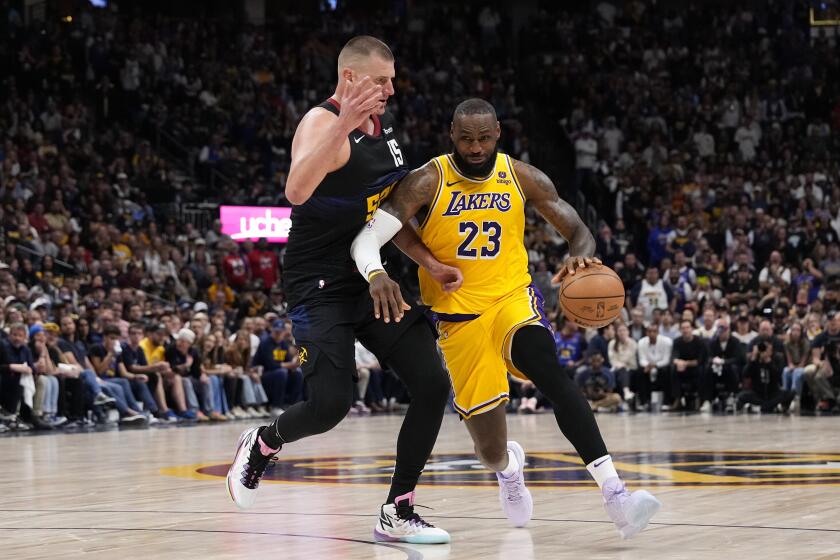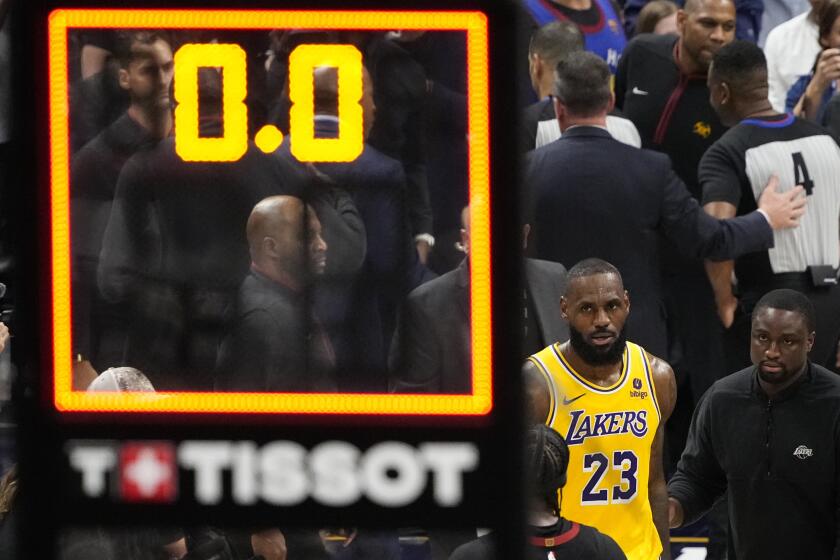Column: On the Lakers’ road back to greatness with LeBron, the hardest steps may still lie ahead
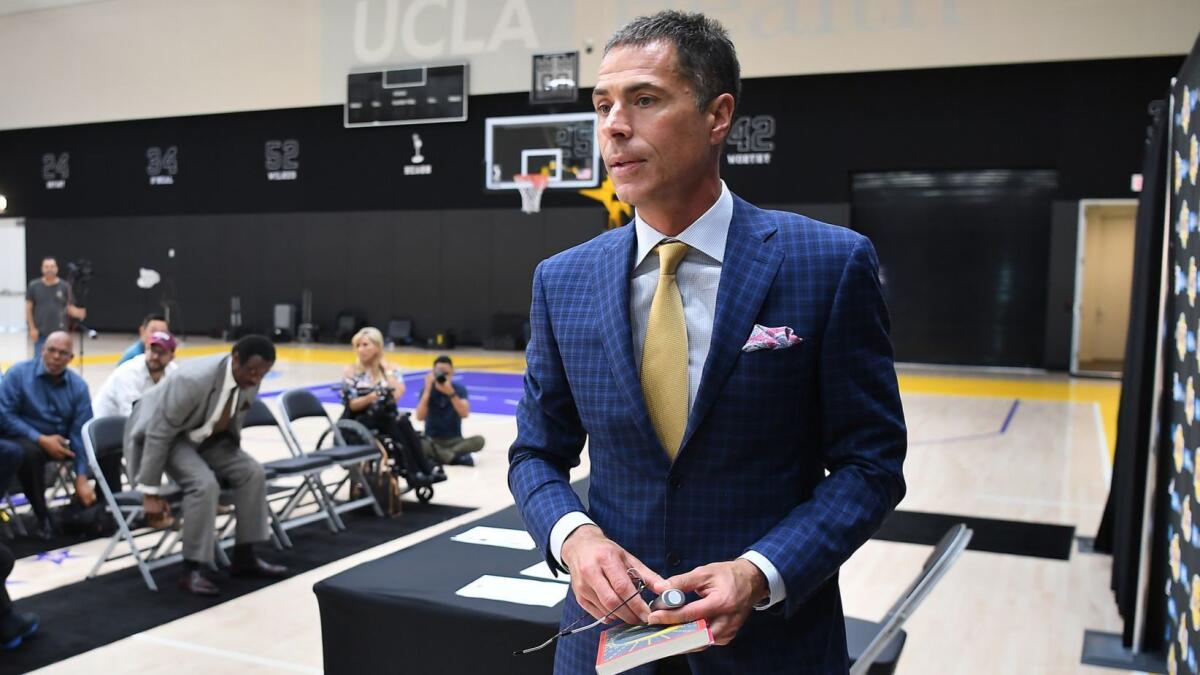
As the euphoria over the earth-shaking news has gradually subsided over the last week and a half, a vital question has emerged from the background and come into greater focus.
Why did LeBron James choose the Lakers?
There are plenty of theories, none of which are particularly convincing. James hasn’t provided any clarity, since he has yet to speak publicly about his decision.
“You’ll have to ask him and pick his brain,” general manager Rob Pelinka said Wednesday at a news conference at the Lakers’ practice facility.
There’s something disconcerting about the inability or refusal on the part of James to convey a clear and credible vision of how he plans to restore the Lakers to their former glory. The absence of a substantive explanation could be interpreted as a signal that the Lakers represented the best option in a series of less than ideal choices, as opposed to the ultimate platform to enhance his claim as greatest basketball player of all time.
The distinction is significant. Thirty-five-win teams shouldn’t look a gift horse in the mouth, but the Lakers are in a win-or-else predicament by virtue of their storied history. As Pelinka acknowledged, it’s essentially championship-or-bust for the Lakers.
“We celebrate one thing, and that’s NBA championships,” Pelinka said.
Failure to win a title over the four years of James’ contract would be an unmitigated disaster.
When James moved from Cleveland to Miami, his ambitions were clear, as well as how he planned to realize them. The same was true of when he returned to Cleveland.
Here, the plans are ambiguous, at best.
The lack of definition has resulted in speculation that the primary motivation behind the move to Los Angeles wasn’t related to basketball.
James owns two homes in the area, and his oldest son will start high school in the fall of 2019. It would make sense for him to want his family to remain in the same city for the entire year, especially if doing so would allow him to be close to his burgeoning production company.
Only it doesn’t seem likely that someone who is known to be as legacy-obsessed as James would compromise his career, regardless of what the city has to offer. It’s not as if James couldn’t oversee his entertainment empire from another market.
The idea that James wanted to be associated with the franchise of the Lakers’ pedigree is also questionable. He’s LeBron James. He’s a brand unto himself. As great as Magic Johnson and Kobe Bryant were, does James really gain much from wearing the same colors they once did?
James could transform a once-proud franchise back into a champion, but it’s not as if the Lakers are the Dodgers, who have an entire generation of fans who have never seen them win a title. Memories of Bryant’s greatest triumphs remain vivid, and that’s what James will be measured against, not the last five years in which the Lakers have failed to reach the postseason.
Pelinka mentioned how James is looking forward to playing with the Lakers’ young core, but if that’s what James wanted, he could have signed instead with the Philadelphia 76ers, who have two potentially dominant forces in Ben Simmons and Joel Embiid.
The immediate plan is to combat the defending champion Golden State Warriors by surrounding James with tough-minded players who are defensively capable.
“I think to try to play the Warriors in their own game is a trap,” said Pelinka, who mentioned the thought was shared by James and president of basketball operations Magic Johnson.
But the plan feels more like a roll of the dice than it does something Pelinka and Johnson actually believe in, evidenced by how James was the only free agent the Lakers signed to a multiyear deal. Rajon Rondo, Lance Stephenson and JaVale McGee are on one-year contracts.
While this grants the Lakers tremendous flexibility in future seasons, the clock is ticking. James is already 33 and he won’t be the league’s best player forever. This isn’t like when Shaquille O’Neal came to the Lakers as a 24-year-old. The window is closing, and it’s closing fast.
“He’s a student of the game,” Pelinka said of James. “He looks at the entire landscape of the NBA, he looks at the trades that have been made, how teams draft players, how they develop them, the style of play. I’m sure he evaluated all those things.”
So maybe James is a step or two ahead of everyone, as he often is on the court. And maybe he knows how he’ll return to the NBA Finals.
Or maybe this was a rare instance in which a platitude spoken at a news conference actually reflected the reality of the situation.
“The work is not done by any stretch of the imagination,” Pelinka said.
If that’s the case, hold on. The hard part of the rebuilding process could still be ahead.
More to Read
All things Lakers, all the time.
Get all the Lakers news you need in Dan Woike's weekly newsletter.
You may occasionally receive promotional content from the Los Angeles Times.

